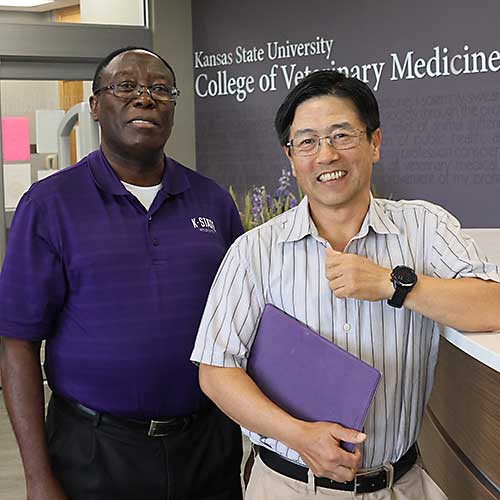September 26, 2023
K-State researchers investigate cow antibodies to stall SARS-CoV-2 virus

A pair of Kansas State University veterinary researchers are helping to explore the possibilities of battling the SARS-CoV-2 virus with cow antibodies as part of a potential therapeutic treatment.
Waithaka Mwangi and Kyeong-Ok Chang have lent their skills in immunology and virology, respectively, to a scientific team composed of researchers from the Applied Biomedical Science Institute, or ABS, Scripps Research, the University of Louisville, OmniAb Inc., and Ligand Pharmaceuticals. The team published a new paper in the Proceedings of the National Academy of Sciences, "The smallest functional antibody fragment: ultralong CDR H3 antibody knob regions potently neutralize SARS-CoV-2." Chang and Mwangi have received NIH R01 funding to further the development of this research and have filed as co-inventors for a provisional patent on the parts of the technology they collaborated on.
"The technology is generating one of the smallest biologically functional therapeutic antibody-based molecules with the potential to result in a new generation of novel mucosal treatment options for SARS-CoV-2 in humans and other animals," Mwangi said. He added that the functional molecule can be delivered as intranasal spray. "If proven effective, the technology will have broad application for management of other diseases."
The team was able to produce the coronavirus binding portion of the antibody, termed a "knob" region, which is a tiny fragment of the large parent antibody.
"At about 3% the size of the original antibody, cow knob regions represent the smallest known functional antibody fragment," said Vaughn Smider, the senior author of the study and president of ABS Institute. "They are approaching the size of some small molecule drugs and are three times smaller than camel antibody-derived 'nanobodies.' Knobs potentially have many biomedical uses, including as therapeutics and diagnostics."
Chang said, "Our labs in the College of Veterinary Medicine [Mwangi, Chang and Yunjeong Kim] have been working with ABS for SARS-CoV-2 project right after COVID-19 pandemic started. This technology has a huge potential for therapeutic development for not only infectious pathogens but other metabolic diseases."
While the current study reveals the utility of knobs in targeting coronavirus, its potential as a therapeutic class spans all therapeutic areas, including oncology and immunology. Future research applications of knobs include using them as targeting regions for nanoparticles, antibody drug conjugates or multispecific therapeutics.
The antibodies and knob regions were induced in cows by Mwangi's laboratory at K-State then discovered and evaluated at the ABS by first author Ruiqi Huang and a team of scientists. The team then characterized for antiviral properties by the laboratories of Chang, Yunjeong Kim, Donghoon Chung at the University of Louisville, and John Teijaro and Dennis Burton, both with Scripps Research. The detailed structural characterization was accomplished at Scripps Research in the laboratories of Ian Wilson, Robyn Stanfield, Andrew Ward, Jane Dyson and Peter Wright.
Industry collaborators, led by William Harriman at OmniAb Inc. and Jeff Allen at Ligand Pharmaceuticals, collaborated in the manufacturing and analytical characterization of the knobs. OmniAb Inc., Ligand Pharmaceuticals, and the ABS-spinout company Minotaur Therapeutics are developing commercial technologies related to knob discovery and development.
